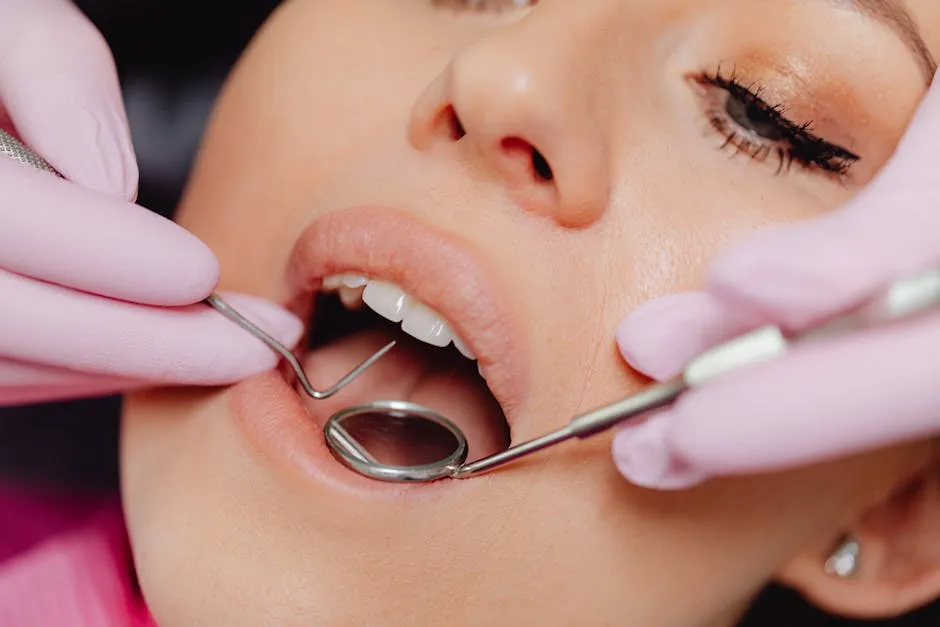
Why Does My Jaw Hurt When I Wake Up?
Introduction
The morning sun rises, your alarm goes off, and as you stretch, a sharp pain jolts through your jaw. Sound familiar? Waking up with jaw pain can turn even the sunniest mornings into a struggle. It’s not just a minor inconvenience; it can seriously impact your day. So, what gives? Why does your jaw feel like it just ran a marathon when you barely moved during the night?
You might think, “It’s just sleep!” But let’s face it, sleep can be a tricky business. Your body’s on autopilot, and it has its own ideas about what’s comfortable. The culprits behind your morning jaw pain can vary widely. From teeth grinding to poor sleep positions, the reasons are as diverse as the number of pillows you have on your bed.
In this article, we’ll uncover the causes of morning jaw pain, explore treatments that can help, and offer practical tips to ensure you wake up ready to tackle the day—without the added jaw discomfort. So, grab your favorite caffeinated beverage, sit back, and let’s get to the root of the problem. Spoiler alert: Your jaw might be throwing a tantrum every morning due to stress, misalignment, or even the way you sleep!
Understanding why you wake up with a sore jaw is the first step toward relief. Whether it’s the tension from a stressful day or the awkward position you sleep in, knowing the cause can empower you to seek the right solutions. Let’s begin this journey to a pain-free morning and discover how simple changes can make a world of difference. After all, who wouldn’t want to wake up refreshed, revitalized, and free from the clutches of jaw pain?

Summary
Waking up with jaw pain can stem from several factors, primarily bruxism (teeth grinding), TMJ disorders, poor sleep positions, and stress. It’s a condition that can disrupt your daily life, affecting everything from your mood to your ability to eat comfortably. Understanding the underlying causes is essential. Key contributors include clenching your jaw during sleep, misalignment of teeth, and even lifestyle factors like stress and diet.
Bruxism, a condition where you unconsciously grind or clench your teeth, is often the main suspect. It can lead to significant wear on your teeth and strain on your jaw muscles, making you feel like you’ve been in a wrestling match overnight. Another common issue is TMJ disorders, which affect the joint connecting your jaw to your skull. These can lead to pain, clicking sounds, and restricted movement.
Sleep positions also play a crucial role. If you’re a stomach sleeper, your jaw may be in a compromising position all night. On top of that, stress and anxiety can lead to muscle tension, exacerbating any discomfort. The good news is that there are effective treatments and lifestyle changes that can alleviate this discomfort. For instance, using a mouth guard for teeth grinding can provide significant relief!

This article will guide you through the causes and solutions, ensuring you wake up refreshed and pain-free. Let’s work together to tackle that morning jaw pain, so you can face your day with a smile!
Causes of Morning Jaw Pain
Waking up with a sore jaw can be an unwelcome surprise. Understanding the root causes can help you address this discomfort effectively. Let’s examine the primary culprits behind morning jaw pain.
Teeth Grinding (Bruxism)
Bruxism is the act of grinding or clenching your teeth, often while you sleep. It’s more common than you might think, affecting about 8% to 31% of the population at some point. So, if you’re experiencing morning jaw pain, you’re not alone!
Symptoms of bruxism can include loud noises during sleep, such as grinding or clenching sounds that wake your partner. Not to mention, you might notice significant tooth wear, which can lead to more serious dental issues. Your jaw may feel tight or painful, like it just completed an intense workout.
The causes of bruxism are numerous. Stress and anxiety are common triggers. If you’ve had a particularly tough week, your body might respond by clenching your jaw at night. Lifestyle factors, like excessive caffeine or alcohol consumption, can also play a role. Even certain medications could contribute to this nighttime habit. To help manage this, consider trying a herbal tea variety pack to help calm your nerves before bed!

To effectively manage bruxism, seeking professional help is essential. why is seeking professional help crucial for managing bruxism in the coming months
Temporomandibular Joint (TMJ) Disorders
TMJ disorders can wreak havoc on your jaw. This condition affects the temporomandibular joint, which connects your jaw to your skull. When this joint is out of alignment or inflamed, it can cause pain, discomfort, and even clicking sounds when you open your mouth.
Symptoms of TMJ disorders include jaw clicking, pain around the ear, and difficulty chewing. You might also feel stiffness in your jaw, making it tough to fully open your mouth. If you’re looking for a way to ease that discomfort, consider a neck support pillow that can help keep your head and jaw aligned while you sleep.

Several factors can lead to TMJ disorders. Misalignment of teeth is a significant cause, as uneven pressure can strain the joint. Arthritis in the jaw joint can also result in pain and stiffness, particularly in the morning.
Poor Sleep Positions
Believe it or not, how you sleep can impact your jaw health. If you’re a stomach sleeper, your head may be turned to one side for hours, straining your jaw and neck muscles. Side sleepers may also suffer if their pillow doesn’t provide adequate support.
To combat this issue, consider adjusting your sleep position. Sleeping on your back with a supportive pillow can help reduce pressure on your jaw. Using a specialized pillow designed for jaw pain can also make a world of difference! You might want to check out an adjustable bed pillow for that perfect fit!

Stress and Anxiety
Mental health plays a surprising role in physical symptoms, including jaw pain. Stress can lead to muscle tension, particularly in the jaw and facial areas. You might not even be aware that you’re clenching your jaw during stressful situations, but the effects can carry over into your sleep.
Chronic stress can manifest in various ways: headaches, neck pain, and yes, jaw discomfort. Finding healthy ways to manage stress, like yoga or meditation, can help ease that tension and improve your overall well-being. A good yoga mat for beginners can be a great tool to start your practice!

Other Contributing Factors
Several other factors may contribute to morning jaw pain.
Dental Issues: Dental problems, such as cavities or gum disease, can cause discomfort that radiates to your jaw. If you’ve recently had dental work, soreness may also occur.
Vitamin Deficiencies: Deficiencies in essential nutrients, particularly calcium and magnesium, can lead to muscle weakness and jaw pain. A balanced diet is crucial for maintaining muscle health. Consider taking calcium supplements to support your overall health!

Sleep Apnea: This condition, characterized by interrupted breathing during sleep, can lead to teeth clenching. If you snore or wake up feeling groggy, sleep apnea might be the underlying issue. A sleep apnea mouthpiece could be a lifesaver!
Understanding the causes of morning jaw pain can empower you to take action. Whether it’s seeking dental advice or making lifestyle changes, addressing these factors can lead to a more comfortable start to your day.

Treatments and Management Strategies
Waking up with jaw pain can feel like a cruel joke played by your own body. Luckily, there are plenty of strategies to ease that discomfort. Let’s break down some effective treatments, from simple lifestyle changes to professional interventions.
Lifestyle Changes
Stress Management
Stress is the ultimate party crasher. It sneaks in and causes us to clench our jaws without even realizing it. To combat this, consider adopting relaxation techniques. Yoga and meditation can work wonders. They not only help you unwind but also promote mindfulness—keeping that jaw tension in check. Even a few minutes of deep breathing can make a difference. You might find yourself saying, “Ahh, that feels better!” as you let go of the stress. If you’re looking for some guidance, a great meditation guide book can help!

Diet Adjustments
Your diet might be playing a sneaky role in your jaw pain saga. Caffeine and alcohol can both contribute to muscle tension. Cutting back on that morning coffee or evening glass of wine could help reduce jaw tightness. Instead, opt for herbal teas or plenty of water. Your jaw will thank you, and so will your body! Consider trying a calming chamomile tea in the evening!

Dental Interventions
Mouth Guards
Let’s talk about the superhero of jaw pain solutions: the mouth guard. Wearing a night guard can protect your teeth and jaw from the relentless grinding that goes on while you sleep. It cushions your teeth and helps align your jaw, reducing that morning soreness. Plus, it’s a small price to pay for a pain-free morning! If you’re looking for an effective option, check out this orthodontic night guard!
Botox Treatments
For those facing severe bruxism, Botox might sound like a beauty treatment, but it’s also a viable solution for jaw pain. Injections can relax the muscles responsible for clenching. Imagine waking up without that tight, sore feeling—pure bliss! Consult with your dentist to see if this option is right for you.
Physical Therapies
Exercises
Who knew there were exercises specifically for your jaw? Gentle stretching and jaw exercises can relieve tension and improve flexibility. Try opening your mouth wide and moving your jaw from side to side. Incorporating neck exercises can also help, as tension in the neck often translates to jaw pain. You’ll be saying, “Move over, Pilates; I have jaw exercises now!” If you’re looking for a tool to aid with this, a jaw exercise tool can be quite beneficial!

Heat and Ice Therapy
Heat and ice therapy can be your best friends. Ice packs can reduce inflammation, especially if your jaw feels swollen. Apply it for about 15 minutes. Following that with a warm compress can ease muscle tension. It’s like giving your jaw a mini spa day! Just remember: always use a cloth between the ice or heat source and your skin to avoid irritation. For added comfort, a heating pad for pain relief can enhance the experience!

Professional Help
When to See a Dentist
If your jaw pain persists, it’s time to call in the professionals. Symptoms that warrant a visit include severe pain, difficulty opening or closing your mouth, and clicking sounds that just won’t quit. Your dentist can assess your situation and help you find the right treatment.
Potential Treatments
Advanced treatments are available if basic interventions aren’t cutting it. Options like physical therapy, orthodontics for alignment issues, or even surgeries in extreme cases can be explored. Your dentist will guide you through the best choices based on your specific needs.
Waking up without jaw pain is a dream many aspire to achieve. By making some lifestyle adjustments, considering dental interventions, and seeking professional help when necessary, that dream can become a reality. So, let’s say goodbye to those painful mornings and hello to a refreshed start!

If you are experiencing issues related to bruxism, understanding why seeking professional help is crucial can provide significant benefits. why is seeking professional help crucial for managing bruxism in the coming months
Conclusion
Waking up with jaw pain can feel like being greeted by an unwelcome alarm clock. It’s the kind of start that throws your day off-kilter before it even begins. But don’t despair! Understanding the causes behind this discomfort is the first step toward reclaiming your mornings.
Bruxism, or teeth grinding, often takes the crown as the main culprit. This sneaky habit can turn your peaceful slumber into a wrestling match for your jaw. Stress and anxiety tend to fuel this nighttime behavior. So, it’s no surprise that those long days at work might lead to tight jaws when you wake up.
Then there’s the notorious TMJ disorder. This little mischief-maker affects the joint that connects your jaw to your skull, leading to pain and that annoying clicking sound. If your jaw feels like it’s auditioning for a percussion band in the morning, TMJ could be the reason.
Let’s not forget about the impact of poor sleep positions. Sleeping like a pretzel can leave your jaw feeling like it just completed a marathon. A supportive pillow can work wonders, so give your neck and jaw the pampering they deserve. To enhance your sleep experience, consider using a comfortable weighted blanket!

Now, here’s the good news: many of these issues can be tackled with simple lifestyle changes. Reducing caffeine intake, engaging in stress-relieving activities, and even using a night guard can make a significant difference. These small adjustments might just be the secret sauce for a pain-free morning routine. To further enhance relaxation, consider a essential oil diffuser to create a calming atmosphere at home.
However, if you find that your jaw pain is persistent or worsening, it’s time to consult a healthcare professional. They can help identify underlying issues and recommend tailored solutions. After all, every jaw deserves to wake up feeling refreshed and ready to take on the day.
Here’s to saying goodbye to those mornings filled with jaw pain! With the right approach and a bit of self-care, you can look forward to waking up revitalized, free from discomfort, and ready to tackle whatever the day throws your way. And don’t forget to treat yourself to some relaxing music CD to unwind!
FAQs
What is bruxism, and how common is it?
Bruxism is the involuntary grinding or clenching of teeth, often occurring during sleep. It’s a common issue, affecting about 8% to 31% of people at various points in their lives. Stress and anxiety tend to trigger this nighttime habit, leading to jaw pain and worn-down teeth. When your jaw muscles work overtime at night, they can feel like they’ve run a marathon by morning, leaving you with discomfort that’s hard to ignore.
How can I tell if my jaw pain is serious?
Not all jaw pain is created equal. If your pain subsides after a few hours, it might not be a cause for concern. However, if you experience severe pain, difficulty opening or closing your mouth, or persistent clicking sounds, it’s time to consult a professional. These symptoms might indicate a more serious issue, such as TMJ disorders or dental problems that require immediate attention. Don’t wait for the pain to intensify; get it checked out.
Can my diet affect my jaw pain?
Absolutely! Your diet plays a crucial role in muscle health. Foods high in caffeine, like coffee and energy drinks, can increase muscle tension, making your jaw more prone to pain. Alcohol and tobacco can also exacerbate bruxism. On the other hand, a balanced diet rich in vitamins and minerals—especially calcium and magnesium—can support muscle function and reduce discomfort. So, next time you reach for that extra cup of coffee, think twice!
Are there home remedies for jaw pain?
Yes, there are several effective home remedies for temporary relief. Applying a warm compress to the jaw can help relax tight muscles, while ice packs can reduce inflammation. Gentle jaw exercises may also alleviate tension. Chewing soft foods is a good idea, too; it reduces strain on your jaw. And don’t forget about stress relief techniques like yoga or deep breathing. They can work wonders for both your jaw and overall well-being!
Is surgery ever necessary for jaw pain?
Surgery is rarely the first option for jaw pain. However, in some cases, it may be necessary. If you have severe TMJ disorders that don’t respond to other treatments, surgical options might be considered. This could involve repairing or replacing the joint. Always consult with a healthcare professional to explore less invasive treatments first. Surgery should be a last resort, after all the other options have been exhausted.
Please let us know what you think about our content by leaving a comment down below!
Thank you for reading till here 🙂
All images from Pexels




